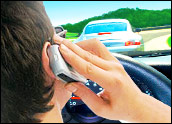
We all know by now that using a cellphone while driving can be a dangerous practice, but talking on a hands-free phone isn’t much better, according to a recent research report.
That’s because people talk on the phone so regularly that they have developed learned habits that take over their awareness, according to Robert Rosenberger, an assistant professor in the School of Public Policy at Georgia Institute of Technology.
The phenomenon is known as “habituation,” and it refers in essence to the fact that the more accustomed we become to something, the less we notice it.
“Using the phone, handheld or hands-free, involves a whole separate set of trained habits, some of which deeply interfere with the job of driving safely,” Rosenberger told TechNewsWorld.
“We’ve trained ourselves to focus on the conversation when we use the phone in the same way we’ve trained ourselves to press the brake when we decide to stop,” he explained. “When behind the wheel, it can be difficult to continuously resist the automatic habit to think more about that phone conversation.”
Rosenberger’s theories are outlined in the April issues of both Communications of the ACM and IEEE Technology & Society Magazine.
What We Do When We Drive
The act of driving a vehicle is complex.
“Many tasks require the driver’s conscious and concerted attention, such as monitoring the roadway, following directions, looking for pedestrians” and so on, Rosenberger said.
Other tasks, such as gripping the steering wheel and pressing the pedals, must be learned by the body. That’s why new drivers must practice behind the wheel — just learning to drive from a book won’t suffice.
“It’s essential that the driver not only know which pedal is the brake, but that she or he also be able to press it almost automatically the moment they decide to slow or stop the car,” Rosenberger explained.
‘We Don’t Even Realize’
People develop deeply habituated relationships with technologies they use daily, and phones are no exception, Rosenberger pointed out. Through normal phone usage, we learn to focus mainly on the conversation whenever we hold a phone to our heads.
“The danger is that when we are behind the wheel, the phone — whether handheld or hands-free — inclines us to focus more on the conversation than the road,” he asserted. “Sure, we can actively resist this urge, but it remains and keeps tugging at us as the driving gets boring or as the phone conversation gets more interesting, and we don’t even realize that we’re being pulled away from our commitment to pay most attention to the road.”
When people try to perform two different tasks to which they are habituated, the brain sends the body conflicting signals. We can manage those dual tasks if we are continuously paying conscious attention — that’s why drivers don’t crash immediately every time they talk on the phone.
“The problems come when we get comfortable or overconfident, and we treat the situation with less care,” Rosenberger said. “It’s then that the phone-related habits creep in and pull our attention away from the road.”
Like Drunk Drivers
Although several states have passed hands-free cellphone laws, research indicates that conversing on hands-free phones “is just as distracting as handheld phoning, once the conversation begins,” Russ Rader, a spokesperson for the Insurance Institute for Highway Safety, told TechNewsWorld.
There are studies that bear out Rader’s comments; several are cited on the IIHS website.
For example, there was a 37 percent reduction in brain activity associated with driving when research subjects using a driving simulator listened on a headset to spoken sentences they had to judge true or false, researchers at Carnegie-Mellon University found.
Drivers who talked on either hands-free or handheld cellphones were as impaired as drunk drivers in a University of Utah study conducted in 2006.
While conversations with passengers in a car can also be distracting, especially to teenage drivers, they can be less dangerous than talking on a cellphone — at least in part because passengers may point out safety risks, help the driver navigate, or shut up when a situation becomes challenging.
More Bumps in the Road
In any case, as the modern car evolves into a mobile entertainment and communications center, there might be more trouble ahead, Rosenberger warned.
Building hands-free calling and texting systems into the dashboards of cars, for instance, “implies that all that drivers need to do is use a hands-free system and they will be safe,” he said, “but this may not be true.”





















































